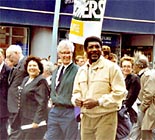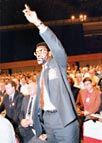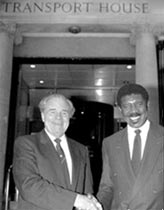Two short spells of employment followed his arrival in England before Bill Morris joined an engineering company, Hardy Spicers, and he attended a day-release course in engineering skills at a local technical college. He became a member of the T&G in 1958 and was elected Shop Steward at Hardy Spicers in 1963.
From that day forward he worked his way up the union, first as an elected member of the governing body of the T&G - the General Executive Council. In 1973 he joined the T&G staff as a District Officer in the Midlands - the UK car and manufacturing belt. He moved to London as one of the National Secretaries (of the Passenger Service Trade Group) in 1979, and seven years later he became Deputy General Secretary.
| Bill Morris was elected General Secretary in 1991 and re-elected in 1995 (by law the full membership of Trade Unions in the UK elect their General Secretaries every five years). He retired from the union at age 65 in October 2003. He was the first black general secretary of a trade union in the UK and arguably one of the most influential black people in Britain. But he made it clear he did not wish to be known or judged as the black General Secretary. As he said at the time of his election, "I am not the black candidate, rather the candidate who is black". |
 Members of the TUC General Council at a Pensioners' Rally. |
First as an Executive member of the T&G and then as an official and later leader, he experienced life under many Prime Ministers including Ted Heath, Harold Wilson, Margaret Thatcher and Tony Blair. Of the Thatcher years, when trade unionism was to change forever, he says: "those were our learning years".
Primarily his fight for workers was with employers. He challenged the Ford Motor Company on the issue of racism when black faces of their workforce were removed from an advertisement and replaced with white faces. Later, Jack Nassa, the then Chief Executive of Fords, came to London from Detroit at Bill Morris's request when he drew attention to appalling discrimination among workers in their Dagenham factory - Asian workers found racist messages scrawled inside sealed pay packets.
| Until his retirement in 2003, Bill Morris's appointments included membership of the TUC General Council and Executive Committee. As a senior member of the General Council he was the lead spokesperson on transport and employment rights. He was President of the TUC and chairing the Congress in Brighton on September 11 2001, when the news came through that two aircraft had flown into New York's Twin Towers. He was also a member of the Executive Board of the International Transport Workers' Federation, a Director of Unity Trust Bank and a member of the Employment Appeals Tribunal from 1988-2008. |

Leading his delegation at a Labour Party Conference. |

successor as T&G General Secretary.

